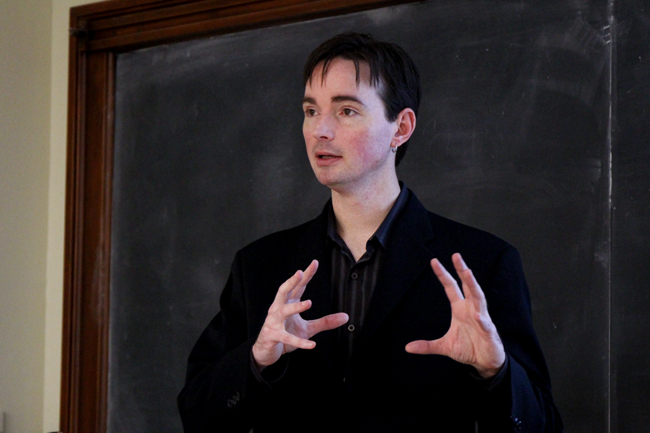Torin Monahan, a communications associate professor from the University of North Carolina, Chapel Hill, said abuses of power by data surveillance agencies could compromise the effectiveness of the Department of Homeland Security’s anti-terrorism operations in a talk Thursday hosted at the Graduate Student Symposium titled “Beyond Counterterrorism: Data Fusion in Post-9/11 Security Organizations.”
The Department of Homeland Security, along with a multitude of other governmental agencies, make up fusion centers — physical collaborations of police, national security and private sector experts — in an effort to aggregate their collected data and compile a full-bodied database of possible security threats. The department expedited the launch of these fusion centers on state, city and regional levels following the breaches in national defense during the 9/11 terrorist attacks of 2001.
“Our technological world tends to collect data by default, and these security organizations have adapted to the imperative of the surveillance society we live in today,” Monahan said. “Just about any data that are out there, they can basically bring together.”
Monahan’s previous research has focused on the way state surveillance promotes social inequalities but said his research on fusion centers has made him more sympathetic, as “information societies are [also] surveillance societies.”
The centers are intended to serve as neutral, apolitical channels for multiple agencies to join forces and physically discuss their shared intel. But most of the 78 fusion centers across the country are housed in police departments — characterizing them less as passive conduits of information and more as groups in active pursuit of threats, according to Monahan.
The issue remains that fusion centers succumb to cultural biases, Monahan said, especially within the centers’ associated police departments.
Though federal law requires “reasonable suspicion” for the storage of information, the FBI has since changed its rule, allowing agents to make quick searches through these databases without recording the information found.
American studies graduate student Carrie Andersen said she feels the population has a general tendency to trust the government, but the lack of transparency makes that trust harder to justify.
“I think it’s a perpetual problem,” Andersen said. “How do you create accountability when the system is so secretive?”
The effectiveness of fusion centers is unmeasurable, but the concept of pooling governmental resources certainly champions efficiency. Simone Browne, assistant professor of African and African Diaspora Studies, said the potential use of the compiled data could still be beneficial as a concept.
“The idea of combining all this data could be very useful for other things — even Amber Alerts,” Browne said.


















